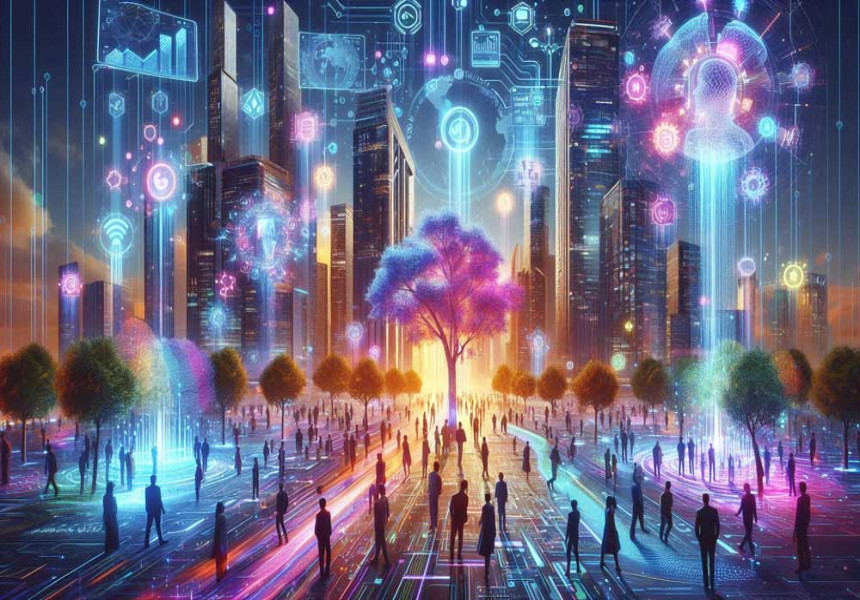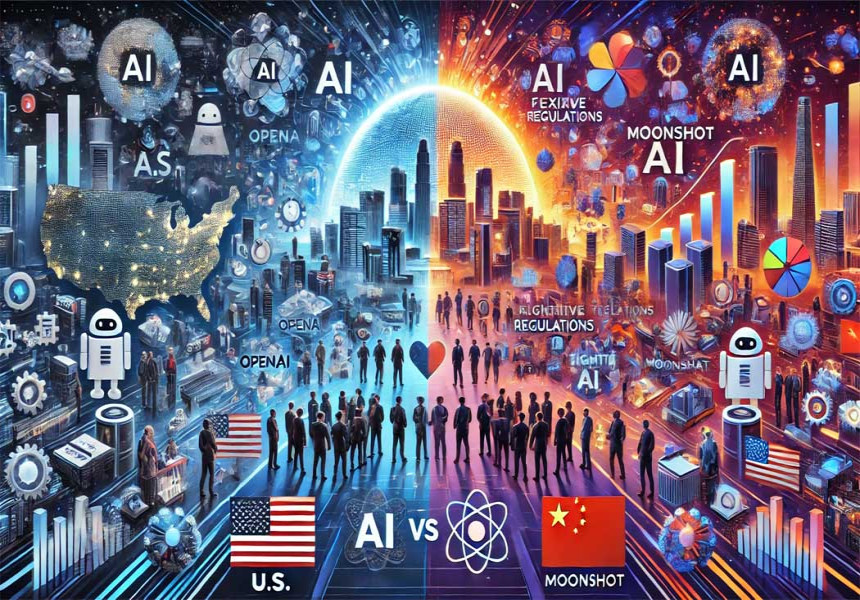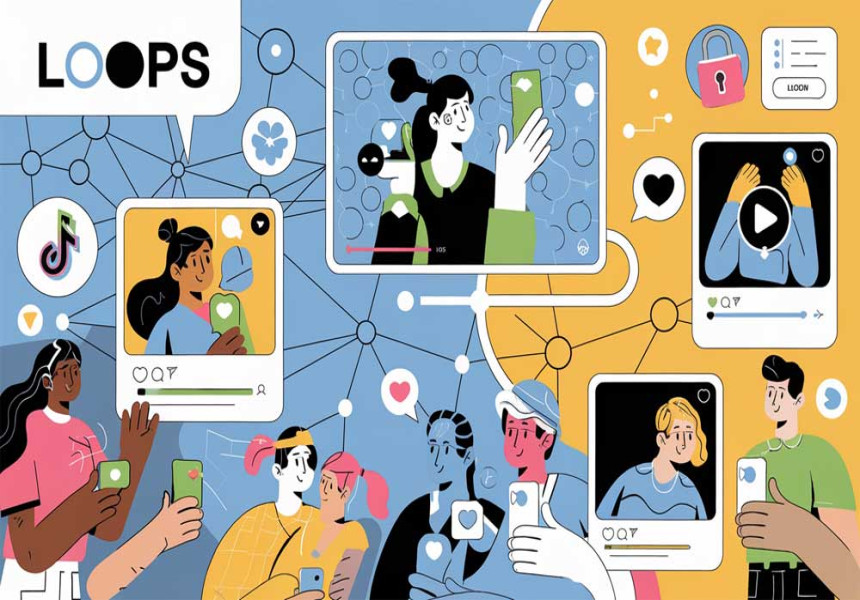From Steam to AI: It's Time for Sharism
We are undoubtedly living through a historic transformation, unprecedented in human history, affecting every level of society, every sector, and every part of the world.
We are living in an era of constant acceleration. The boundaries between physical and digital are dissolving, and technology is no longer just a tool: it is the invisible infrastructure shaping how we think, work, create, connect, and even dream.
This transformation is not only technological, but anthropological—with profound social and political impacts. A new paradigm is emerging, whose impact may equal—or even surpass—that of the Industrial Revolution.
Just as steam engines, electricity, and railways radically reshaped society in the 18th and 19th centuries, today algorithms, neural networks, blockchain, artificial intelligence, cybersecurity, and distributed systems are redefining every aspect of human existence.
But every revolution needs a compass: a shared vision to guide change.
In this context, there is an urgent need to develop a new social philosophy, capable of responding to the challenges of our time—challenges too complex to be addressed with the rules inherited from the very Industrial Revolution that now belongs to the past.
It is from this perspective that our proposal takes shape: Sharism.
From steam to algorithms: the new raw material is shared knowledge
During the Industrial Revolution, machines replaced humans. Manual labor was supplanted by mechanical work, and entire societies reorganized around factories. Cities exploded, economies globalized—but at a high price: growing inequalities, alienation, labor exploitation, and environmental devastation.
Today, artificial intelligence and digitalization are doing the same with the human mind: automating thought, writing, and design. The “factories of thought” are digital platforms, cloud systems, and data centers. But at what cost, if wealth is increasingly concentrated in the hands of a few who can exploit the aggregative—and often monopolistic—power of technological algorithms?
The new raw material is no longer coal or iron, but information.
The risks of ignoring the value of sharing
If this digital revolution is driven solely by profit or data control, we risk falling into a new kind of alienation—more sophisticated, but just as dangerous:
-Phygital becomes passive entertainment instead of a space for genuine human connection.
-AI replaces human intelligence instead of amplifying it collectively.
-Closed platforms exploit sharing rather than rewarding it.
Without a vision like that offered by Sharism, sharing may degenerate into surveillance, and participation may become dependence.
The Challenges Ahead
Just as the Industrial Revolution brought about environmental and social challenges, the digital revolution carries significant risks. Sharism can be the compass—but only if we create the necessary conditions for its success:
-Protection of digital rights and privacy.
-Prevention of power concentration among big tech monopolies.
-Promotion of accessible digital education for all.
Work, AI, and the Necessary Transition
The rise of artificial intelligence and automation is accelerating the transformation of the workforce. Millions of jobs—not just manual, but also intellectual—are set to disappear or be profoundly reshaped. Without a collective vision and shared strategies, this revolution could lead to mass unemployment, social polarization, and global instability.
In this context, Sharism becomes a key lever for managing the transition:
-Promotes distributed and collaborative work models, where value no longer comes only from individual productivity but from peer interaction.
-Fosters inclusivity, ensuring emerging opportunities are accessible to different segments of the population, narrowing the digital divide.
-Encourages shared reskilling through open learning communities, immersive experiences, and ongoing knowledge exchange.
-Supports collaborative innovation, valuing and enabling co-creation environments.
-Strengthens more resilient economic ecosystems, where contributors to collective growth receive recognition, credit, and opportunity.
If we fail to manage this shift with intelligence and solidarity, the consequences will be catastrophic. Sharism offers a way to transform a looming crisis into a historic opportunity to reinvent work and the way we live together.
Toward a New Digital Social Contract
Just as new laws were once needed to regulate labor and industrial production, today we urgently need to build a new social contract for the Phygital AI era. Sharism can become the heartbeat of this transformation.
This is not utopia—it’s a real opportunity: to create a future where innovation is not just fast, but fair; where progress is not just profitable, but inclusive.
Sharism is a cultural vision that redefines power, value, and participation. If we embrace it, we can turn this revolution into a real opportunity to improve everyone’s life.
From industrial production to immersive co-creation
During the Industrial Revolution, economies shifted from craftsmanship to mass production powered by machines. Today, in the Phygital AI world, we are undergoing a new transformation: from production to co-creation, from simple distribution to immersive interaction.
It’s no longer just about “selling a product,” but about engaging people in integrated experiences where value arises from mutual collaboration.
The public is no longer a passive consumer, but an active participant: creator, witness, and co-developer of the content they help generate. And the most powerful form of this new reality is the shared one.
Sharism: A Social Philosophy for the Phygital AI Era
Originally developed by Isaac Mao during the rise of social media, the concept of Sharism now takes on renewed meaning.
In a world where every object, content, or space can become interactive and data-generating, sharing no longer means just distributing—it means creating value: not only economic, but also social, cultural, and relational.
In the Phygital AI context, Sharism translates into:
-The economy of interaction: the more users participate, the more the platform and community grow in shared value.
-Augmented collective intelligence: AI, IoT, and XR don't evolve from a central authority, but from a continuous flow of shared experiences.
-Ethical experience design: sharing must be voluntary, transparent, incentivized, and, above all, respectful of individual privacy.
Sharing to Generate the Future
In the new Phygital AI world, those who share multiply value. Sharism is not an idealistic choice, but a necessary condition to remain human in an age increasingly driven by automation.
Being a sharist means:
-Seeing others as creative allies, not competitors.
-Designing participatory experiences, not consumerist ones.
-Creating value together, not at others’ expense.
Sharism is the ethical roadmap for this new era. By following it, we can build a digital world that is not only smarter, but also fairer, more vibrant, and truly ours.
Sharism is a cultural and strategic response to the logic of accumulation and ownership, typical of industrial capitalism. It proposes a paradigm shift: growth doesn't come from owning, but from sharing.
Sharism highlights that every individual carries a “social memory”—a wealth of ideas, experiences, emotions, and insights. When this wealth is shared openly and collaboratively, it generates a new collective intelligence—more powerful than any closed algorithm or isolated system.
Sharism is the belief that sharing ideas, information, and creativity empowers collective intelligence. It is a cultural answer to the model of exclusive ownership: instead of accumulating, Sharism proposes multiplying.
In stark contrast to industrial capitalism—based on control and competition—Sharism promotes openness, collaboration, and mutual trust. It is not just an ideology but a winning strategy for the new phygital ecosystem.
A New Phygital Humanism
Just as the 19th century gave birth to public schools, labor laws, and cooperative movements, today we need a new Phygital AI humanism, based on co-creation, inclusivity, and transparency.
Sharism is the foundation of this new architecture:
-Free and conscious access to hybrid spaces
-Open and cooperative business models
-Decentralized intelligent networks
-Distributed creativity
-A culture of gifting and shared reputation.
Why Sharism Is Crucial Today
In today’s digital landscape, social and economic dynamics are undergoing a radical transformation.
Emerging technologies and new models of interaction are redefining how we work, learn, and collaborate.
In this context, Sharism is not just a philosophy — it’s a necessary response for navigating toward a fairer, more collaborative future. Here’s why it matters now more than ever:
1. Knowledge Networks Replace Hierarchies
Projects like Wikipedia and GitHub show that distributed collaboration can outperform centralized structures. Knowledge is no longer the privilege of the few, but the output of a global network that thrives through sharing.
2. AI Needs Open and Ethical Ecosystems
Artificial Intelligence grows through data. The more open and diverse the data, the more effective the algorithms become. Sharism promotes sharing as a key enabler for the development of ethically-aligned collective intelligence.
3. Decentralization Is Rising
Blockchain, Web3, and DAOs are all advancing the redistribution of digital power. Sharism aligns perfectly with this vision, advocating for shared and transparent management of resources and information.
4. New Models of Creativity and Ownership
NFTs, remixes, and open-source content are redefining what it means to be an author and what gives something value. Sharism values contribution over ownership, encouraging a co-creation culture that transcends accumulation.
Sharism, therefore, is not just an ideal theory but a concrete and urgent answer to the challenges of a world in continuous transformation.
Practical Applications of the New Phygital AI World Guided by Sharism
The Phygital AI world, powered by Sharism, offers extraordinary opportunities to transform traditional sectors into highly interactive and collaborative experiences. In this new paradigm, sharing and co-creation are guiding principles. Here are some practical examples:
🧳 Tourism & Lifestyle
Travel destinations become interactive experiences, previewed through immersive Phygital tours and bookable live.
Travelers are no longer just spectators but co-creators of their journeys, sharing personalized itineraries, sensory experiences, and routes tailored to their interests — building a living ecosystem driven by collective participation.
🏛 Art, Fashion & Culture
Museums and art galleries become true “interactive cultural nodes”: what you see in person extends into the digital, and what you share contributes to the creation of new works (remixes, NFTs, 3D environments).
In fashion, Virtual Try-On + NFTs + Phygital showrooms transform each garment into a story to be told and reinterpreted. The consumer becomes a participant, turning the shopping experience into a collective act of creation.
🧵 Craftsmanship
Artisans showcase and explain their creative processes through live digital workshops and Phygital showcases, turning each product into a unique narrative and a learning experience — preserving and spreading centuries-old know-how.
Products become interactive experiences that clients can personalize, remix, and co-create, enabling a new Phygital proximity economy.
🌾 Local Agriculture
Local farmers connect directly with consumers through interactive digital marketplaces, where users can explore the stories behind each product.
Thanks to the transparent Phygital supply chain, food value is more fairly distributed, and consumers become active ambassadors of the land — supporting sustainability and uplifting small producers.
🍷 Food & Beverage
Gourmet products and wines are featured on Phygital iTV+, where storytelling blends with immersive interaction (live chats, remote tastings, unlockable exclusive content).
The sommelier evolves from a passive mediator to a cultural creator, connected to a global network that shares experiences, advice, and emotions in real time.
The Role of XHubs, DAOs, and INXA Ai Agent
Projects like Nexth iTV+, XHubs, and the INXA Ai Agent embody a Sharist model of Phygital AI — where participation and co-creation are central to the experience. These projects don't just merge physical and digital worlds — they foster a collaborative ecosystem rooted in Sharism’s principles. Here's how:
-XHubs are interactive physical spaces connected to media platforms. People are not just viewers — they share, participate, and co-create content and experiences in real time. Each space becomes a living hub of dynamic interaction.
-INXA Ai Agent collects and analyzes real-time data from shared experiences — not to centralize information, but to redistribute value to all contributors, human or machine, creating a more equitable and transparent flow of benefits.
-DAOs (Decentralized Autonomous Organizations) provide governance tools for communities, allowing them to co-decide on events, content, and strategies. Transparency and shared decision-making are essential, giving every member a voice in shaping the ecosystem.
In Sharism, innovation is not just technological — it's also social and cultural. It offers an alternative to the centralized and competitive systems that dominate today’s digital world.
In this new ecosystem, Sharism is both an ethical compass and an operational strategy. It guides us in building a shared future — where every experience is a collective act of creation, every interaction generates value, and each person becomes the protagonist of their own evolution.
Sharism invites us to rethink our relationship with technology — not as a tool for isolation, but as a bridge for connection, creation, and collaboration.
Technology gives us the tools.
But it's up to us to decide — do we use them to shut ourselves in… or open ourselves up?
Because the future cannot be bought.
It must be shared.
For more on Sharism, visit:
🌐 https://sharism.wiki
🌐 https://sharism.xyz









